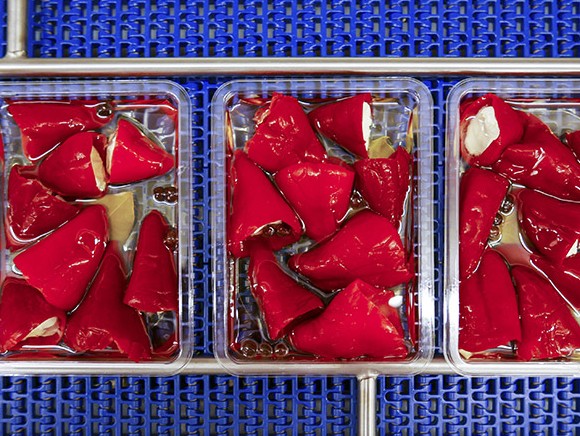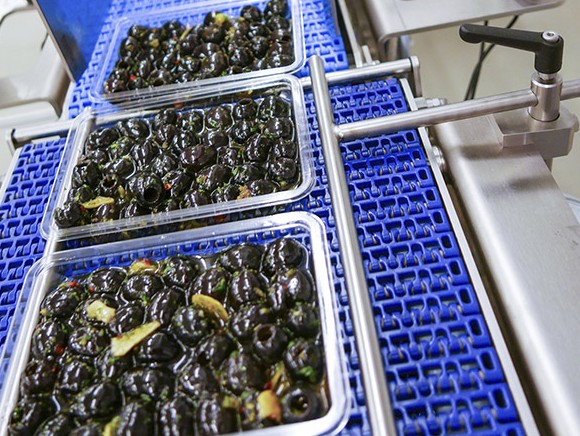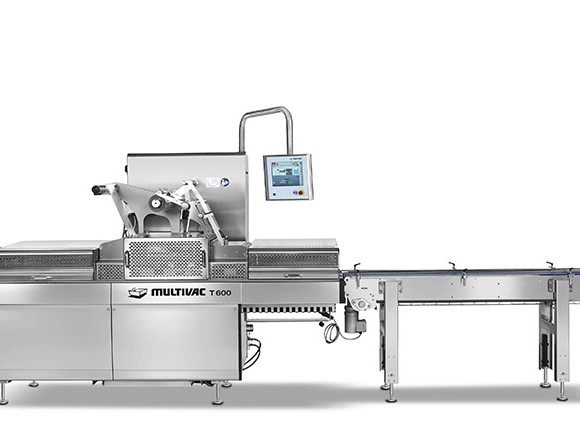
Master butcher Hanspeter Baer was considered extremely brave when, in 1999, he decided to start selling fresh olives and antipasti instead of meat and home-smoked products. Despite all the advice to the contrary, he went ahead with his plan. Now, thanks to the new Multivac T 600, 15,300 packs a day will soon be rolling off the line.
Within the space of a decade, Hanspeter Baer’s company, Ceposa AG (headquartered in Kreuzlingen), has become one of Switzerland’s biggest producers of fresh antipasti. With its own 24-hour service the firm supplies around eight tonnes of hand-processed olives and antipasti per week to Swiss customers. Since the company was founded, 30 full-time jobs have been created and, depending on the season, the company employs between 35 and 50 people. In order to guarantee consistently high-quality products, Hanspeter Baer sources the raw materials directly from selected southern European producers, many of whom he knows personally. During processing, the company only adds rapeseed oil, premium herbs and rock salt to the Mediterranean delicacies. The products are still fresh and flavoursome when they arrive at retail customers, packaged in transparent, resealable trays in a modified atmosphere.
In early 2015 it was time to replace the packaging machine; the rapeseed oil was causing too many problems with the electronics. This not only led to ever-rising repair and maintenance costs but also caused considerable downtime. “When looking for a new machine, an important aspect for us was that the electronics were very well protected,” explains Andres Kaspar, Head of Purchasing, Operations and Quality Management at Ceposa. He also placed a high value on the supplier having a local representative because, in the manufacture of fresh products with a short shelf life, it is important that any technical problems are resolved quickly and competently. Two packaging machine manufacturers submitted a proposal.
The production department was already working with a C 400 vacuum pack chamber machine and two compact T250 tray sealers from Multivac, which is why Andres Kaspar preferred to source a tray sealer from the same supplier. “We’d had good experience with these machines, and also with the professional service provided by the company and the quick availability of spare parts,” he says. For him, the closeness of Multivac Switzerland is a big advantage because service engineers can be on site in no time if necessary. “In addition, Multivac’s proposal was also more attractive from a commercial perspective,” is how he explains his ultimate decision for the new version of the T 600. He was immediately impressed by the versatility of the machine, which can produce both vacuum packs and MAP. ”We want a completely dependable packaging solution which will keep our delicate products fresh for as long as possible.” “Our head of purchasing wanted the very best, and he got it,” laughs company owner Hanspeter.
Employees fill the trays by hand. An automatic filler then doses the oil into the trays that are then put on the conveyor leading to the tray sealer, which seals 1,200 trays per hour. Problems caused by the oil are a thing of the past. The electrical systems are housed in a control cabinet next to the machine. The T 600 is rated in the protection class IP65, so the control cabinet doesn’t even need to be covered during cleaning. The system offers optimal ease of use: “The large touchscreen works completely intuitively,” emphasises Andres Kaspar.

The new tray sealer has been operational since June 2015, but it took considerable effort to get the machine installed. “The machine had to be transported to the production area,” recalls Andres Kaspar. “That was a tough challenge to solve because the machine was much too big to fit into our lift. Three Multivac service engineers eventually solved the problem in conjunction with the lift company and a logistics expert. The machine was disassembled into smaller parts and as many extras as possible were removed. They used all kinds of aids, such as mobile trolleys and hoists. It was a perfect example of teamwork,” says Andres Kaspar, full of praise.

Because the T 600 can seal four trays at once, the machine is perfectly aligned with the company’s plans to expand production capacity, explains Andres Kaspar: “We’re going to use the full capacity of four packs per cycle and eight cycles per minute. Moreover, Ceposa intends to extend the production time to eight hours a day, meaning that 15,300 packs a day can roll off the line. It’s an excellent investment.” The next expansion on the T 600 will enable the company to also pack larger trays comprising several different compartments for different types of antipasti. They are even considering trays for one kilo bulk, but that’s not yet possible in the current production area. “As soon as the planned expansion has been completed, the T 600 will be integrated in an automated packaging line complete with new metal detectors, a checkweigher and an oil dosing unit,” states Andreas Kaspar.
Source: © Multivac